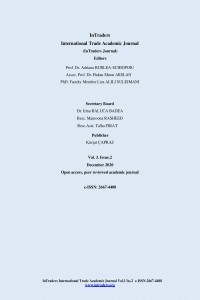Has the Great Recession and the Pandemic been one of the Triggers for the rise in Unemployment? A Comparative analysis: Türkiye & EU27
Unemployment rate; Great Recession, Covid-19; macroeconomic variables; labour market policies., Unemployment rate, Great Recession
Has the Great Recession and the Pandemic been one of the Triggers for the rise in Unemployment? A Comparative analysis: Türkiye & EU27
Unemployment rate great Recession, Covid-19, macroeconomic variables, labour market policies,
___
- Aktar, I. & Ozturk, L. (2009). Can Unemployment be Cured by Economic Growth and Foreign Direct Investment in Turkey? International Research Journal of Finance and Economics, 27, 203-211.
- Atlas Economic Complexity (October 2022). Retrieved from https://atlas.cid.harvard.edu/countries.
- Berument, M.H., Dogan, N. & Tansel, A. (2009). Macroeconomic Policy and Unemployment by Economic Activity: Evidence from Turkey. Emerging Markets Finance and Trade, 45(3), 21-34, DOI: 10.2753/REE1540-496X450302.
- Bildirici, M., Ersin, Ö. Ö., Türkmen, C. & Yalçınkaya, Y. (2012). The Persistence Effect of Unemployment in Turkey: An Analysis of the 1980-2010 period. Journal of Business Economics and Finance, 1(3), 22-32. Retrieved from https://dergipark.org.tr/en/pub/jbef/issue/32419/360515.
- Doğan T. T. (2012). Macroeconomic Variables and Unemployment: The Case of Turkey. International Journal of Economics and Financial Issues, 2(1), 71-78.
- Doornik, J. A., & Hendry, D. F. (2013). Empirical econometric modelling using PcGive (7th ed., Vol. I). London: Timberlake Consultants Press.
- European Council (June 1993). Retrieved from https://www.consilium.europa.eu/media/21225/72921.pdf.
- EUROSTAT (2022). Database. Retrieved from Database - Eurostat (europa.eu).
- Loungani, P. (June 2011). El rostro humano de las ciencias económicas. Prakash Loungani traza una semblanza de George Akerlof. Finanzas & Desarrollo. 48(2), 2-5. Retrieved from https://www.imf.org/external/pubs/ft/fandd/spa/2011/06/pdf/people.pdf.
- OECD (2017). Employment and Skills Strategies in Turkey, OECD Reviews on Local Job Creation. OECD Publishing, Paris, https://doi.org/10.1787/9789264279506-en.
- OECD (2020). Job Creation and Local Economic Development 2020: Rebuilding Better. OECD Publishing, Paris, https://doi.org/10.1787/b02b2f39-en.
- OECD (2021a). Economic Policy Reforms 2021: Going for Growth: Shaping a Vibrant Recovery. OECD Publishing, Paris, https://doi.org/10.1787/3c796721-en.
- OECD (2021b). OECD Economic Surveys: Turkey 2021. OECD Publishing, Paris, https://doi.org/10.1787/2cd09ab1-en.
- TurkStat (2022). Database [Database file]. Retrieved from https://www.tuik.gov.tr/Home/Index.
- UNDP (2022). Human Development Report 2021/2022. Uncertain Times, unsettled lives: shaping our future in a Transforming World. Retrieved from https://hdr.undp.org/system/files/documents/global-report-document/hdr2021-22pdf_1.pdf .
- World Bank (November 2022). Retrieved from https://www.worldbank.org/en/country/turkey/overview.
- Wooldridge, J. M. (2009). Introductory econometrics: A modern approach. Fifth edition. South-Western. USA.
- Yayın Aralığı: Yılda 2 Sayı
- Başlangıç: 2018
- Yayıncı: Kürşat ÇAPRAZ
Uluslararası Vergileme İş Birliğinde Güncel Eğilimler
Uçak Etkinliğinin Operasyonel ve Finansal Metrikler Açısından Analitik Olarak İncelenmesi
Andrijana BOJADJİEVSKA DANEVSKA
María Jesús ARROYO FERNÁNDEZ, Pedro FERNÁNDEZ SÁNCHEZ, María-carmen GARCÍA-CENTENO, Inmaculada HURTADO OCAÑA
The Competitiveness Position of The Republic of North Macedonia: Opportunities And Weaknesses
Kristina VELİCHKOVSKA, Nehat RAMADANİ
The Innovation Development of the European Union: Regional Clustering
